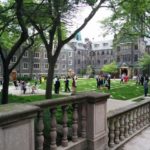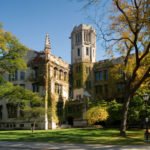The 11 HBCUs in North Carolina: Which is Right for You?
Historically Black Colleges and Universities (HBCUs) were established before 1964 to serve Black students who were denied traditional educational opportunities. Today, there are 107 HBCUs across the country that offer degree programs to students of all backgrounds, with advantages like strong student support systems and career advising. Eleven of the nation’s HBCUs are situated in North Carolina. Read on to learn all about these schools, their academic programs, and their histories. Location: Concord Acceptance Rate: N/A Undergraduate Enrollment: 120 Originally founded by the Presbyterian Church to serve newly emancipated African-Americans in 1867, Barber-Scotia College is a small HBCU offering programs in areas such as business entrepreneurship, criminology, education, religious studies, and sports management. It’s also the first and only HBCU to offer a degree in renewable energy. Location: Greensboro Acceptance Rate: 96% Undergraduate Enrollment: 500 One of just two historically Black women’s colleges in the U.S., Bennett College was founded in 1874 as a coeducational school for newly emancipated slaves. The college is a member of the United Methodist Church. Offering 15 majors, 17 minors, 4 dual-degree programs with NC AT&T State University, and three cooperative degree programs, Bennett boasts strong academics and extracurricular opportunities. Location: Elizabeth City Acceptance Rate: 66% Undergraduate Enrollment: 1,600 “To Live Is to Learn” is the motto of ECSU, an HBCU offering 37 bachelor’s degrees and four master’s degrees across four schools: Arts & Humanities; Business and Economics; Education and Psychology; and Mathematics, Science and Technology. Along with top programs in aviation and pharmacy, the university has special programs, such as its honors program, and a PharmD degree in collaboration with the University of North Carolina at Chapel Hill. Location: Fayetteville Acceptance Rate: 69% Undergraduate Enrollment: 5,400 Part of the UNC system, FSU is one of the top-ranking producers of African American graduates in the U.S. It was ranked the number-one school in North Carolina by Best Value Schools and has top-ranking programs in a number of areas, including psychology, criminal justice, sociology, business, fire science, nursing, and many others. Location: Charlotte Acceptance Rate: 47% Undergraduate Enrollment: 1,400 JSCU, a Presbyterian-affiliated, private HBCU, provides a liberal art curriculum that prepares students in a number of fields. It has several colleges and schools, including the College of Arts and Letters, College of STEM, College of Professional Studies, and School of Social Work. The university also offers a Certificate Program and University College for students who aren’t ready to declare a major. On the field, JSCU has a rivalry with Livingstone College dating back to the 19th century. Location: Salisbury Acceptance Rate: 50% Undergraduate Enrollment: 1,100 Founded by the African Methodist Episcopal Zion Church in 1879, Livingstone College is a private college that boasts strong programs across a number of niches, including business, STEM, education, social work, and more, across a liberal arts and career-preparation curriculum. Previously, the school encompassed Hood Theological Seminary, which became independent in 2001. Location: Greensboro Acceptance Rate: 58% Undergraduate Enrollment: 10,600 North Carolina A&T is currently the largest HBCU in the country and consistently high-ranking. It has many notable graduates, including Ronald McNair, a NASA astronaut who died in the Challenger crash in 1986. Top programs include engineering, agriculture, psychology, and journalism. Students excel outside the classroom, too; the Blue and Gold Marching Machine is renowned and appeared in the Macy’s Thanksgiving Day Parade. Location: Durham Acceptance Rate: 68% Undergraduate Enrollment: 6,400 NCCU was the first public liberal arts institution for African American students in the nation. Today, it calls itself a “future-focused modern university,” offering top programs in business, education, STEM, and many other disciplines across its School of Business, School of Education, School of Law, School of Library & Information Sciences, College of Health & Science, College of Arts, Social Sciences & Humanities, and School of Graduate Studies. Location: Raleigh Acceptance Rate: 63% Undergraduate Enrollment: 1,300 The second-oldest HBCU in the U.S. and first established in the South, Shaw is a Baptist-affiliated university with many claims to fame. For example, it was the first college in North Carolina to have a four-year medical school, as well as the first HBCU to admit women. Currently, Shaw offers 24 academic programs, with accredited programs in social work, theology, and education. Location: Raleigh Acceptance Rate: 63% Undergraduate Enrollment: 700 SAU was established by the Episcopal clergy in 1867, originally for the purpose of educating freed slaves. Today, it offers more than 20 undergraduate degree programs across its multiple schools, including the School of Business, Management & Technology; School of Humanities, Education, Social & Behavioral Sciences; School of Sciences, Mathematics & Public Health; and Division of Military Science. Location: Winston-Salem Acceptance Rate: 65% Undergraduate Enrollment: 4,700 WSSU is one of the top-ranking academic institutions for social mobility. It has programs in arts and entertainment; business, leadership & entrepreneurship; communications, languages & media; and education. The university also offers certification and master’s degrees, along with a Doctor of Nursing Practice, Doctor of Physical Therapy, and Transitional Doctor of Physical Therapy. Most of these schools are moderately selective, so you’ll want to make sure your academics are up to par. Many selective schools use academic strength to filter out unqualified candidates before looking at the more qualitative components of students’ applications. You can find out your chances of acceptance CollegeVine’s free Chancing Engine. We’ll use data from your profile, including your grades, test scores, extracurriculars, and more, to estimate your real odds of admission to North Carolina’s HBCUs and hundreds of other colleges across the county. What’s Covered:
The 11 Undergraduate HBCUs in North Carolina
1. Barber-Scotia College
2. Bennett College
3. Elizabeth City State University
4. Fayetteville State University

5. Johnson C. Smith University
6. Livingstone College
7. North Carolina A&T State University
8. North Carolina Central University
9. Shaw University
10. St. Augustine’s College
11. Winston-Salem State University
What Are Your Chances of Acceptance?



